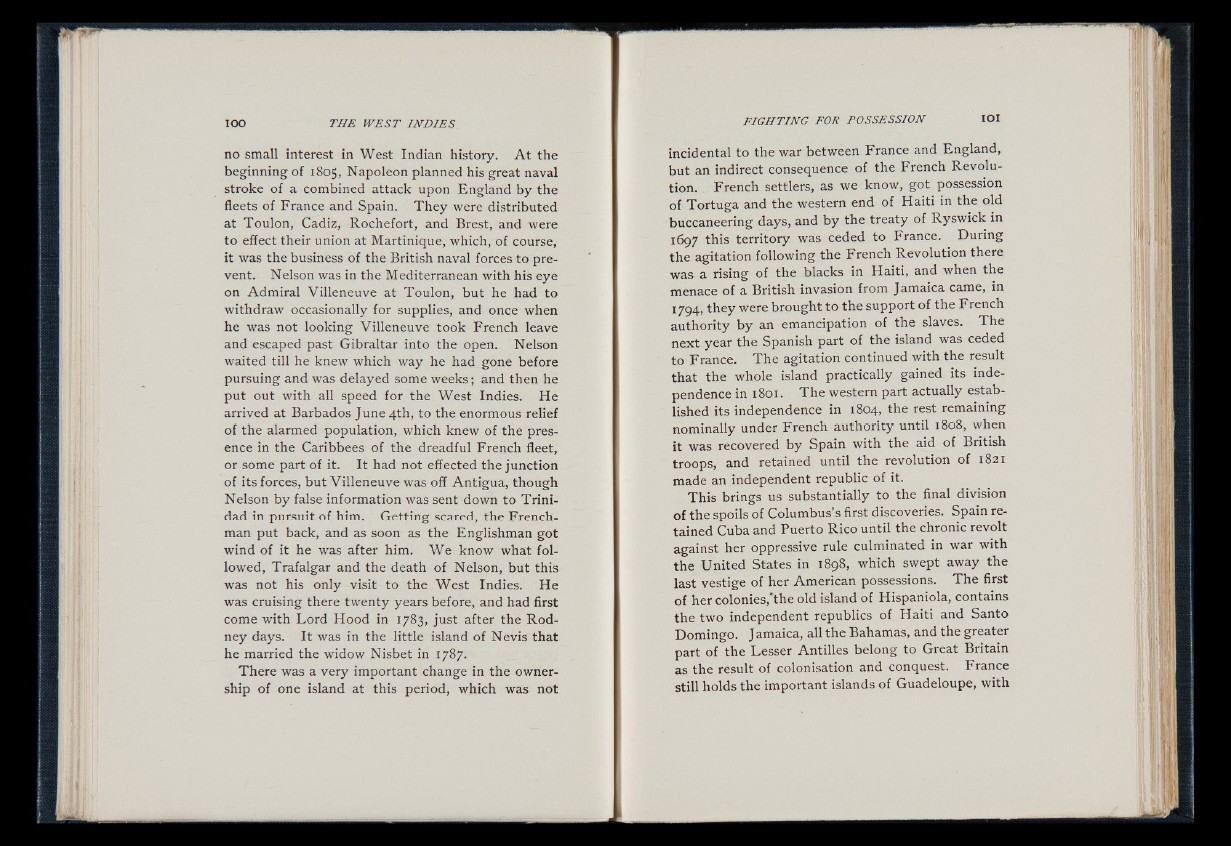
no small interest in West Indian history. A t the
beginning of 1805, Napoleon planned his great naval
stroke of a combined attack upon England by the
fleets of France and Spain. T h e y were distributed
at Toulon, Cadiz, Rochefort, and Brest, and were
to effect their union at Martinique, which, of course,
it was the business of the British naval forces to prevent.
Nelson was in the Mediterranean with his eye
on Admiral Villeneuve at Toulon, but he had to
withdraw occasionally for supplies, and once when
he was not looking Villeneuve took French leave
and escaped past Gibraltar into the open. Nelson
waited till he knew which way he had gone before
pursuing and was delayed some we eks; and then he
put out with all speed for the West Indies. He
arrived at Barbados June 4th, to the enormous relief
of the alarmed population, which knew of the presence
in the Caribbees of the dreadful French fleet,
or some part of it. It had not effected the junction
of its forces, but Villeneuve was off Antigua, though
Nelson by false information was sent down to Trinidad
in pursuit of him. Getting scared, the Frenchman
put back, and as soon as the Englishman got
wind of it he was after him. We know what followed,
Trafalgar and the death of Nelson, but this
was not his only visit to the West Indies. He
was cruising there twenty years before, and had first
come with Lord Hood in 1783, just after the Rodney
days. It was in the little island of Nevis that
he married the widow Nisbet in 1787.
There was a very important change in the ownership
of one island at this period, which was not
incidental to the war between France and England,
but an indirect consequence of the French Revolution.
French settlers, as we know, got possession
of Tortuga and the western end of Haiti in the old
buccaneering days, and b y the treaty of Ryswick in
1697 this territory was ceded to France. During
the agitation following the French Revolution there
was a rising of the blacks in Haiti, and when the
menace of a British invasion from Jamaica came, in
1794, they were brought to the support of the French
authority by an emancipation of the slaves. T he
next year the Spanish part of the island was ceded
to France. The agitation continued with the result
that the whole island practically gained its independence
in 1801. T h e western part actually established
its independence in 1804, the rest remaining
nominally under French authority until 1808, when
it was recovered by Spain with the aid of British
troops, and retained until the revolution of 1821
made an independent republic of it.
This brings us substantially to the final division
of the spoils of Columbus’s first discoveries. Spain retained
Cuba and Puerto Rico until the chronic revolt
against her oppressive rule culminated in war with
the United States in 1898, which swept away the
last vestige of her American possessions. T h e first
of her colonies,'the old island of Hispaniola, contains
the two independent republics of Haiti and Santo
Domingo. Jamaica, all the Bahamas, and the greater
part of the Lesser Antilles belong to Great Britain
as the result of colonisation and conquest. France
still holds the important islands of Guadeloupe, with